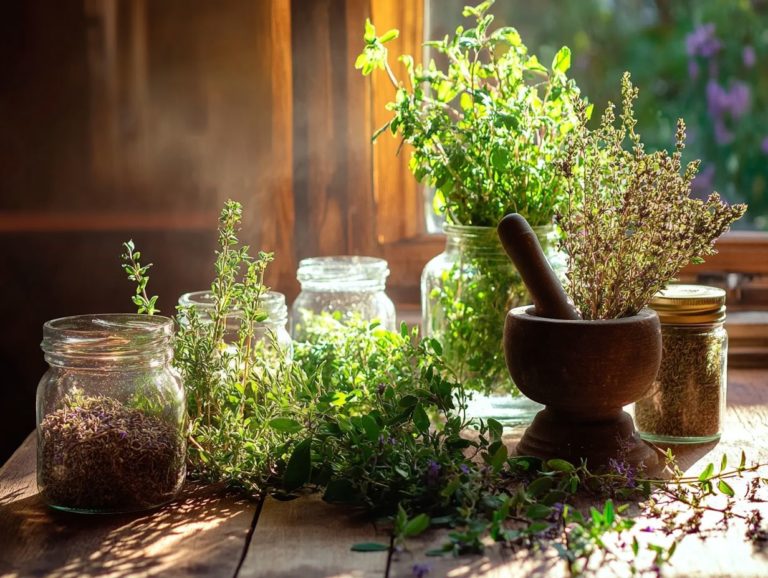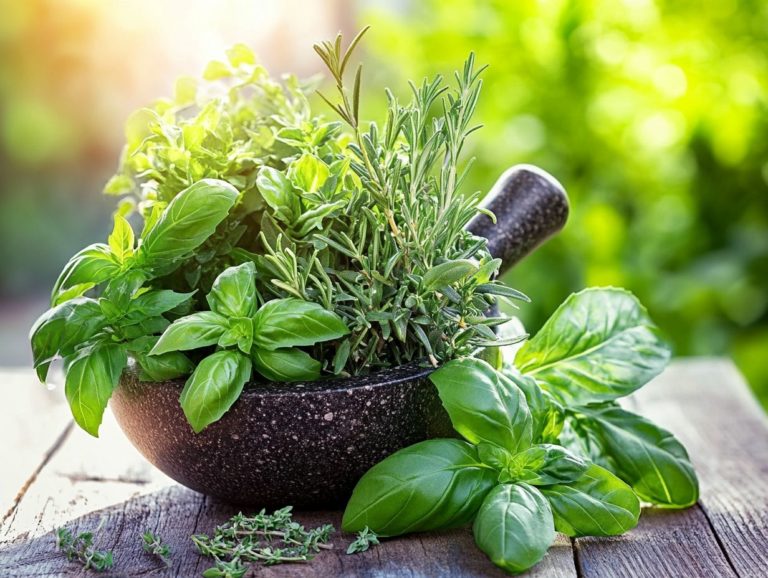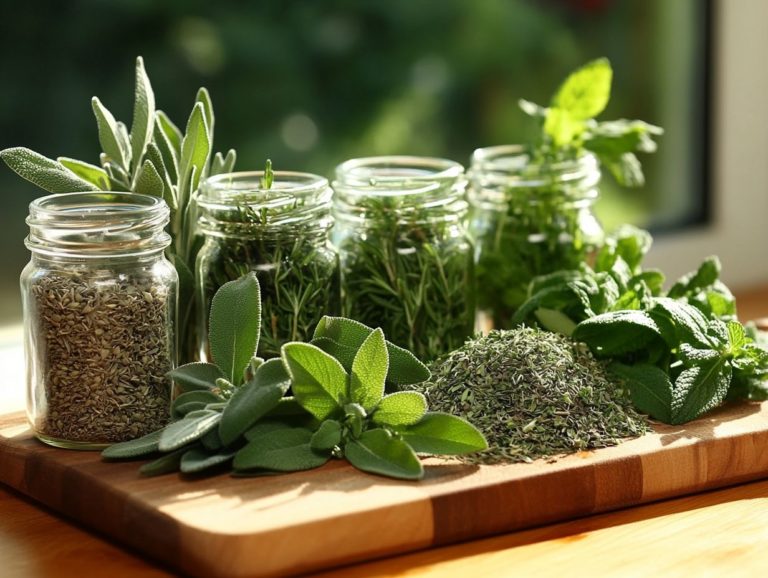Top Herbal Solutions for Reducing Cholesterol
Managing cholesterol levels is essential for your heart health, and many individuals are looking to nature for effective solutions. This article delves into 15 powerful herbs that can assist in lowering cholesterol levels, blending ancient wisdom with modern insights.
From garlic and turmeric to green tea and olive leaf, these herbal remedies may offer a natural alternative to traditional medications. You’ll explore the significance of cholesterol, understand the risk factors involved, and learn about potential side effects associated with heart disease.
You will also learn practical ways to add these herbs to your diet.
Dive in now to discover how nature can boost your health!
Contents
- Key Takeaways:
- 1. Garlic
- 2. Turmeric
- 3. Ginger
- 4. Cinnamon
- 5. Flaxseed
- 6. Green Tea
- 7. Holy Basil
- 8. Fenugreek
- 9. Artichoke
- 10. Psyllium
- 11. Red Yeast Rice
- 12. Hawthorn
- 13. Guggul
- 14. Olive Leaf
- 15. Licorice Root
- Frequently Asked Questions
- Looking for the best herbs to lower your cholesterol?
- How does garlic help in reducing cholesterol levels?
- Can turmeric be used to lower cholesterol?
- What is the recommended dosage for ginger to reduce cholesterol?
- Is fenugreek effective in lowering cholesterol?
- How can guggul help in reducing cholesterol?
Key Takeaways:
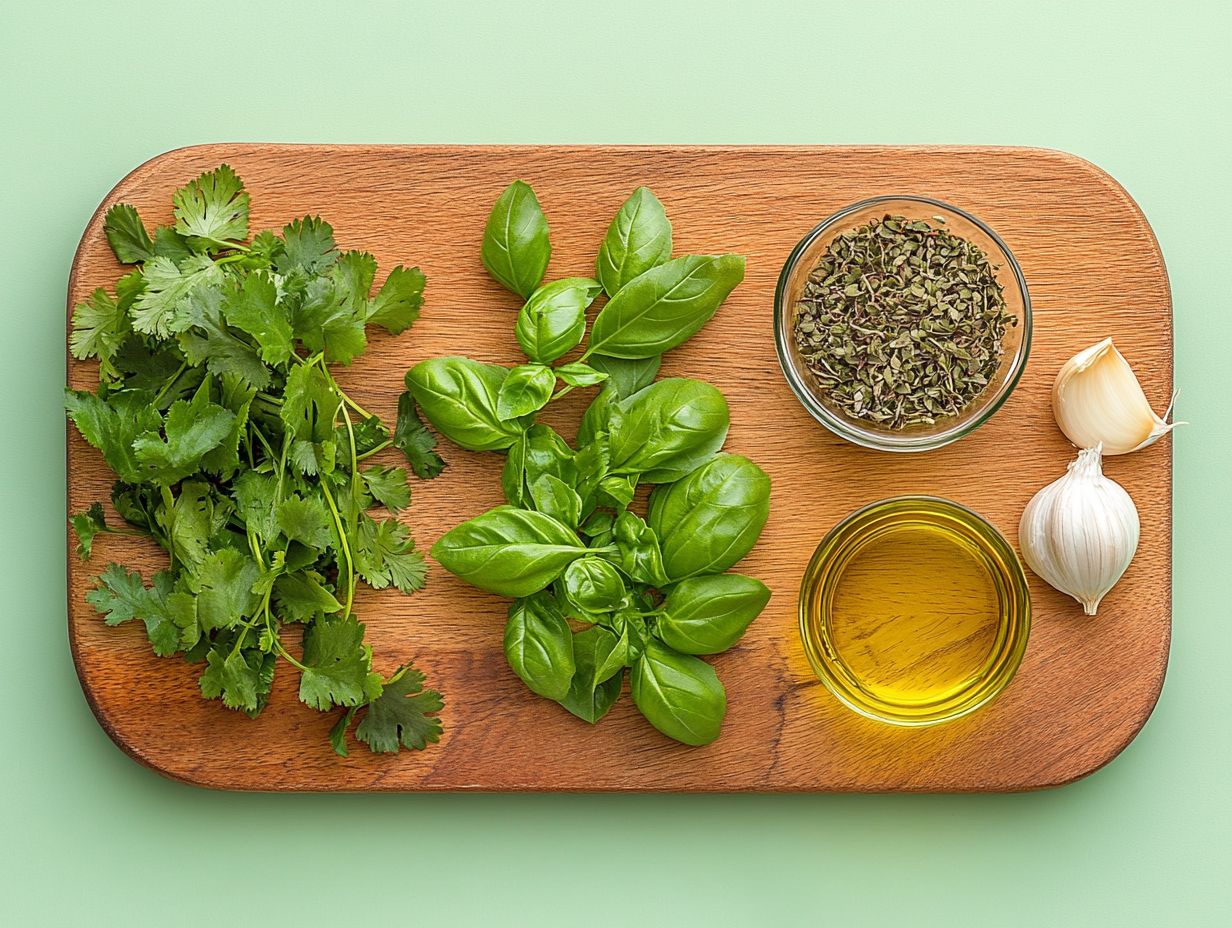
- Garlic, turmeric, and ginger are top herbal solutions for reducing cholesterol due to their anti-inflammatory and antioxidant properties.
- Incorporating herbs like cinnamon, flaxseed, and green tea into your diet can help lower cholesterol levels and improve overall heart health.
- Artichoke, hawthorn, and psyllium are also effective herbal remedies for managing cholesterol, but it’s important to consult with a healthcare professional before use.
1. Garlic
Garlic is renowned for its remarkable cholesterol-lowering properties. It also offers various health benefits, making it a favored natural remedy for boosting HDL cholesterol and reducing LDL cholesterol. This dual action significantly promotes heart health and overall wellness.
The magic behind these benefits lies in allicin, a potent compound released when garlic is crushed or chopped. This bioactive powerhouse works to inhibit the process your body uses to make cholesterol in the liver, thereby supporting your cardiovascular function.
To seamlessly integrate garlic into your healthy diet, consider enjoying it raw by adding minced garlic to salads or spreads. Alternatively, you can lightly cook it to preserve its benefits while enhancing the dish’s flavor. For those who prefer convenience, garlic supplements offer a straightforward option, delivering concentrated doses of its beneficial properties without the strong taste and aroma of fresh garlic.
2. Turmeric
Turmeric, celebrated for its anti-inflammatory properties, can be instrumental in managing cholesterol levels. It holds the potential to lower both LDL cholesterol and triglycerides, thereby diminishing the risk of heart disease and fostering a healthier lifestyle.
The active compound in turmeric, curcumin, is thought to enhance liver function, facilitating the breakdown of fats in the bloodstream. If you’re eager to tap into these benefits, incorporating turmeric into your daily meals can be both simple and delightful think of adding it to curries, soups, or smoothies as an excellent starting point.
When paired with other herbs, such as ginger, turmeric exhibits synergistic effects that can further amplify its cholesterol-lowering capabilities. This combination not only elevates the flavors of your dishes but also enhances the health-boosting properties, making it a savvy choice for anyone aiming to improve heart health naturally.
3. Ginger
Ginger has become a revered natural remedy known for its ability to lower cholesterol levels, particularly by reducing LDL cholesterol. It also offers a range of health benefits that help combat heart disease and counteract the effects of trans fats.
This effectiveness can be attributed to active compounds such as gingerol, which boasts remarkable anti-inflammatory and antioxidant properties that promote cardiovascular health.
To fully enjoy these benefits, consider incorporating ginger into your daily meals by:
- Grating it into stir-fries,
- Blending it in smoothies,
- Or adding it to soups for an extra kick.
If you re in the mood for something warm, brewing ginger tea is a simple and soothing choice. Plus, because ginger can enhance digestion, it’s wise to pay attention to how it interacts with other dietary changes, like increases in fiber or fat intake, to ensure optimal outcomes for cholesterol management.
4. Cinnamon
Cinnamon is a remarkable spice that plays a vital role in lowering cholesterol levels, especially LDL cholesterol. It also helps manage blood sugar levels and contributes significantly to cardiovascular wellness.
Numerous studies highlight the impressive properties of this aromatic delight. Its plant compounds may reduce inflammation and improve lipid profiles.
Imagine adding a sprinkle of cinnamon to your morning oatmeal. Not only does it enhance flavor, but it also boosts your antioxidant intake.
Consider healthier baking options like cinnamon-infused whole-grain pancakes or muffins. You can enjoy the advantages of cinnamon while delighting your taste buds.
5. Flaxseed
Flaxseed is brimming with omega-3 fatty acids and dietary fiber. It s an exceptional choice for lowering cholesterol levels and promoting heart health.
The star player in flaxseed is alpha-linolenic acid (ALA), an omega-3 fatty acid that enhances cardiovascular health by reducing inflammation. It also improves lipid profiles.
Incorporate flaxseed into your diet in various forms whole, ground, or as a fiber supplement. Try sprinkling ground flaxseed over yogurt or oatmeal.
Blend it into smoothies or use it as an egg substitute when baking. These simple additions support healthy cholesterol levels and create a satisfying culinary experience.
6. Green Tea
Green tea is more than a refreshing beverage; it s an ally in managing cholesterol levels. It boosts HDL cholesterol while lowering LDL cholesterol, supporting your cardiovascular health.
Research reveals that catechins, the main antioxidants in green tea, are crucial in this process. They protect arteries and enhance blood circulation, which is essential for heart health.
To enjoy these advantages, aim for 2 to 3 cups of green tea daily. Regular consumption can lead to significant improvements in cholesterol profiles.
This simple addition can have a big impact on your balanced diet and heart health.
7. Holy Basil
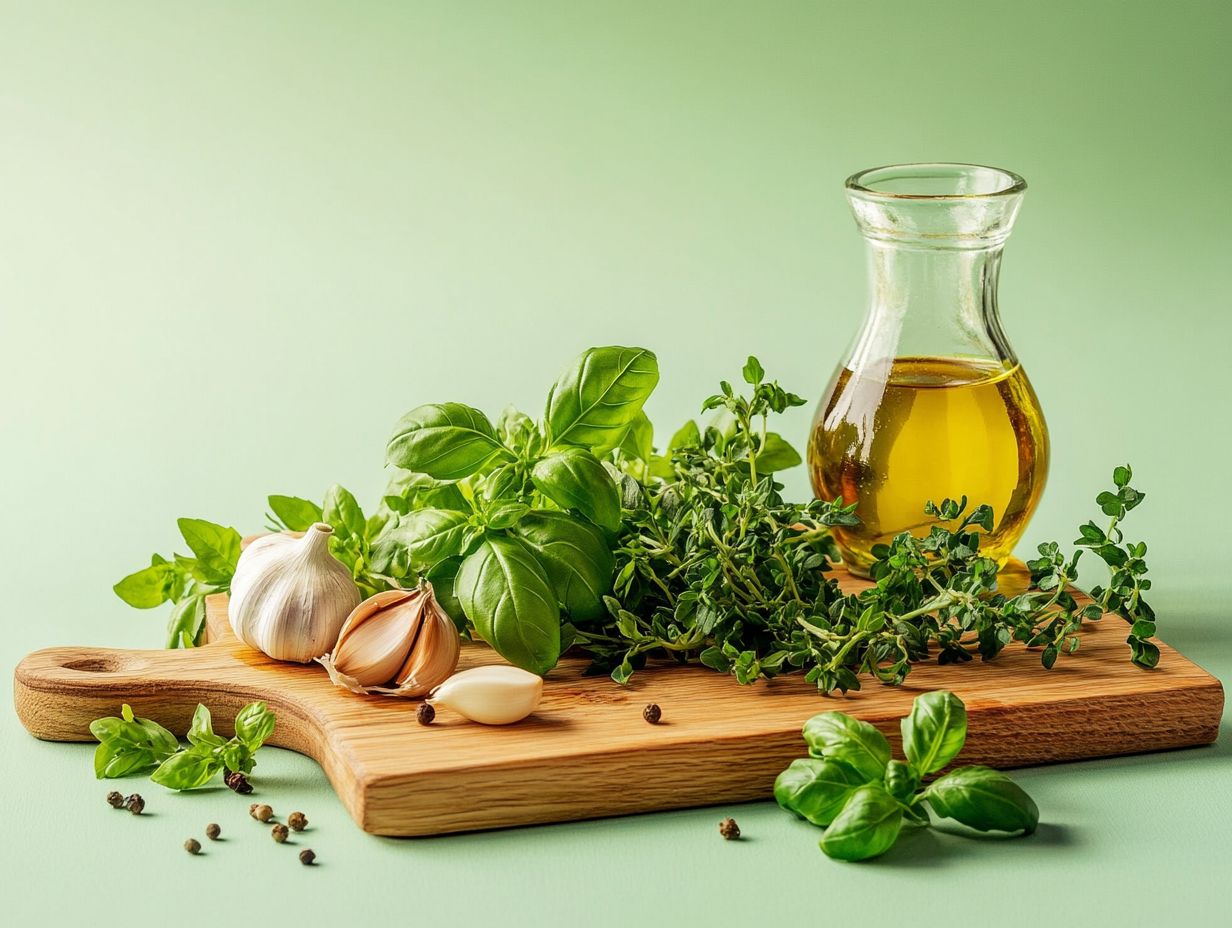
Holy Basil is known for its medicinal properties and is often featured in natural remedies for heart health. It s a valuable addition to a healthy diet.
This aromatic herb is packed with phytochemicals like eugenol and rosmarinic acid. It supports cardiovascular wellness and enhances your overall well-being.
Incorporate Holy Basil into your meals by adding fresh leaves to salads, soups, or stir-fries. Brewing a soothing tea with dried Holy Basil is another delightful way to enjoy its health benefits.
This also helps improve digestive health and relieve stress.
8. Fenugreek
Fenugreek seeds are not just a delightful spice to elevate your culinary creations; they also pack a powerful punch when it comes to health benefits. By incorporating these seeds into your diet, you can lower cholesterol levels and enhance your heart health, thanks to their impressive dietary fiber content.
This soluble fiber plays a crucial role in maintaining a healthy cholesterol balance by helping to reduce cholesterol absorption in your bloodstream. You can easily boost your fiber intake by adding fenugreek seeds to your meals think curries, smoothies, or even baked goods.
Starting your day with fenugreek sprinkled over your breakfast cereal or mixed into yogurt can be a tasty and nutritious choice. Consistently including this herb in your diet, along with regular exercise and a balanced nutrition plan, can pave the way for long-term health improvements.
9. Artichoke
Artichoke is a nutrient-dense vegetable that you ll want to embrace for its potential to lower cholesterol levels and enhance heart health. It’s often found in natural remedies and is a stellar addition to any healthy diet.
Rich in compounds like cynarin, artichoke not only supports your digestive health but also actively works to lower “bad cholesterol.” This makes it a valuable ally for maintaining a healthy heart.
You can easily incorporate this versatile vegetable into a range of meals artichoke hearts shine when tossed into salads, blended into dips, or used as a delightful pizza topping.
Steaming or grilling artichokes elevates their flavor, transforming them into a nutritious side dish or snack. By regularly enjoying artichoke, you can boost your overall well-being, thanks to its antioxidant properties and ability to support liver function.
10. Psyllium
Psyllium is a soluble dietary fiber known for its impressive ability to lower cholesterol levels, especially “bad cholesterol.” This makes it an excellent fiber supplement for anyone aiming to enhance their heart health.
This remarkable fiber works by forming a thick liquid in your digestive tract, binding with bile acids from cholesterol and helping to eliminate them from your body. This process makes your liver use stored cholesterol to produce more bile acids, effectively lowering cholesterol levels.
It s super easy to add psyllium to your meals! Just mix it into smoothies or baked goods for a boost. You can also find convenient capsules to take alongside your meals.
To truly maximize psyllium’s benefits, maintain a balanced diet rich in fruits and vegetables and stay adequately hydrated. These factors significantly enhance the fiber’s cholesterol-lowering effects.
11. Red Yeast Rice
Red yeast rice is a staple in traditional Chinese medicine, renowned for its cholesterol-lowering properties, particularly its effectiveness in reducing LDL cholesterol levels. This makes it a favored natural remedy for managing cholesterol.
The secret lies in its active ingredients, especially monacolin K, which inhibits cholesterol production in the liver. This natural compound works similarly to statin medications, promoting cardiovascular health while avoiding many side effects of pharmaceuticals.
When combined with other natural therapies like Guggulipid a herbal remedy derived from Commiphora mukul you may find your lipid management significantly enhanced. Guggulipid is believed to support thyroid function and boost fat metabolism, creating a synergistic effect that optimizes your overall cholesterol reduction strategy.
Start adding these ingredients to your diet today for a healthier tomorrow!
12. Hawthorn
Hawthorn is a popular herbal remedy. It helps manage cholesterol levels and supports heart health.
This strong herb lowers bad cholesterol while promoting good cholesterol. It significantly contributes to overall heart health. Many wellness enthusiasts have embraced hawthorn in various forms, from soothing teas to convenient supplements.
These options allow you to easily include it in your daily wellness routine. Savor it as a calming tea or choose a concentrated supplement. Feel free to combine it with other herbal products, like garlic or ginger, for extra heart benefits!
13. Guggul
Guggul is a time-honored herbal remedy that has been used for centuries, especially for managing cholesterol. It primarily lowers LDL cholesterol levels, which is vital for heart health.
The active compounds in guggul, particularly guggulsterones, enhance the liver’s ability to metabolize fats and improve lipid profiles. Research shows that taking 500 to 1,000 mg of guggul extract two to three times daily can be effective.
To weave guggul into your diet, consider using it as a supplement or adding guggul powder to your smoothies and herbal teas. This way, you can ensure a consistent intake while enjoying its health benefits.
14. Olive Leaf
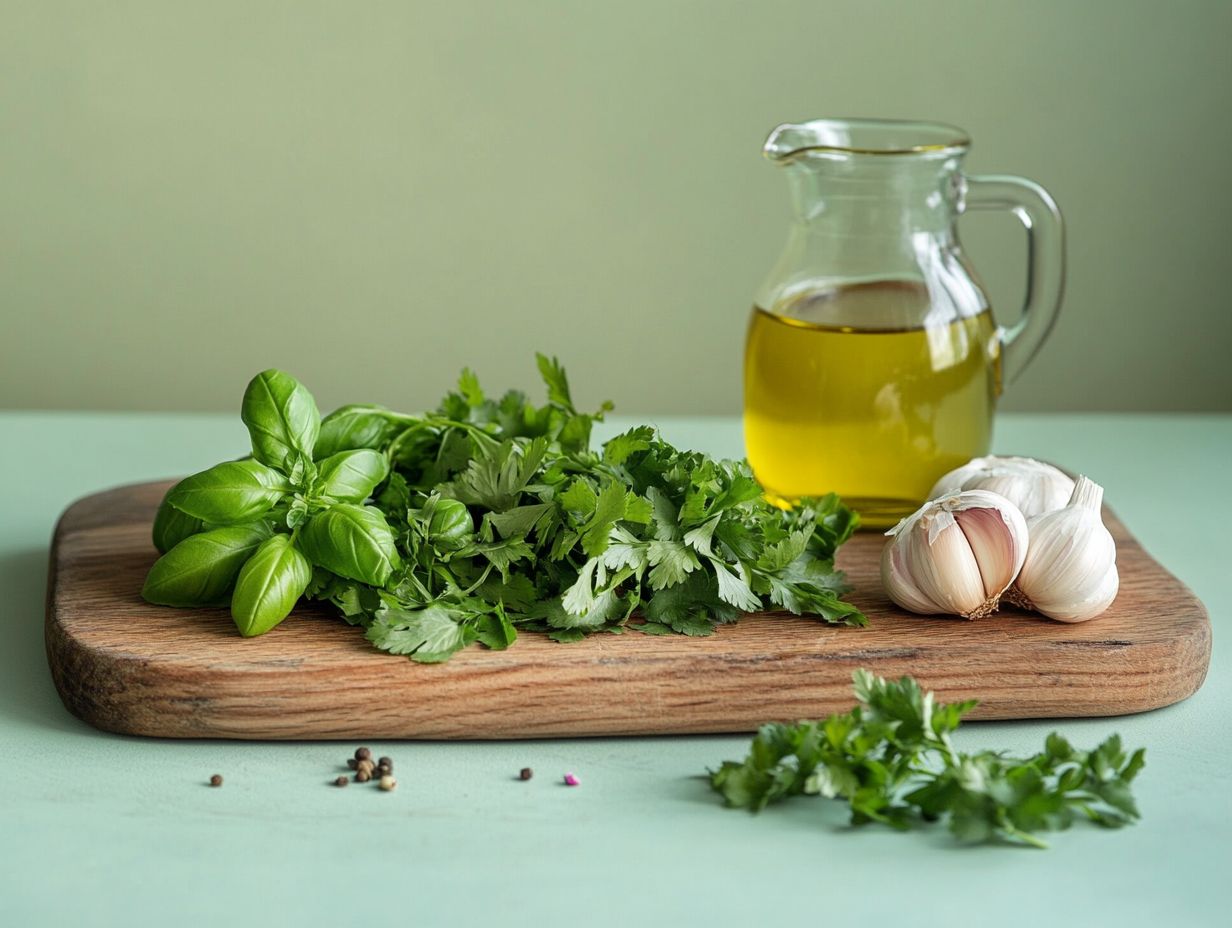
Olive leaf extract is gaining recognition for its impressive potential to lower cholesterol levels and combat heart disease. It is a sought-after option among herbal supplements for enhancing cardiovascular health.
The extract s star player, oleuropein, is known for its powerful antioxidant and anti-inflammatory properties. Together, these attributes promote heart health by helping to regulate lipid levels in your body.
Recent studies suggest that oleuropein may significantly reduce both total cholesterol and LDL cholesterol. To incorporate olive leaf into your diet, enjoy a calming cup of olive leaf tea, which is readily available at health food stores. For those with busy lifestyles, capsules offer a convenient way to harness the benefits without the fuss of brewing.
15. Licorice Root
Licorice root is more than just a sweet flavor; it s a cherished natural remedy that may help lower cholesterol levels, providing various health benefits related to heart health.
This remarkable herb is packed with natural substances, including glycyrrhizin and flavonoids, known for their cholesterol-lowering potential. These compounds may help reduce LDL cholesterol levels while promoting a healthier lipid profile.
To include licorice root in your diet, moderation is essential. Enjoy it in teas, tinctures, or as a supplement, but be cautious excessive intake can lead to unwanted side effects. By adding this herbal remedy to a balanced diet rich in fruits, vegetables, whole grains, and lean proteins, you can boost your cardiovascular health.
What Is Cholesterol and Why Is It Important to Manage It?
Cholesterol is a waxy substance present in your blood. It plays a crucial role in various bodily functions. However, maintaining a delicate balance between HDL cholesterol (the good kind) and LDL cholesterol (the bad kind) is vital for preventing heart disease and managing your overall cholesterol levels effectively.
This balance matters because HDL works to transport cholesterol away from your arteries and back to your liver for removal. Elevated levels of LDL can contribute to plaque buildup in the arterial walls. Therefore, it’s essential to keep an eye on your cholesterol levels regularly, especially since high cholesterol can quietly increase your risk for heart disease. Factors like a poor diet, inactivity, obesity, and family history can make this risk even more pronounced.
By making informed lifestyle choices such as embracing a heart-healthy diet filled with fruits, vegetables, and whole grains and incorporating regular exercise you can significantly improve your cholesterol levels and promote long-term cardiovascular health.
What Are the Risk Factors for High Cholesterol?
Understanding the risk factors for high cholesterol is vital for effective management. Various lifestyle changes, dietary habits, and genetic factors can all contribute to elevated cholesterol levels and increase the likelihood of developing heart disease.
Recognizing the critical role diet plays allows you to make informed choices. This means cutting back on saturated fats found in red meats and full-fat dairy products while boosting your intake of fiber-rich foods like fruits, vegetables, and whole grains.
Don t underestimate the importance of regular physical activity. Incorporating just 30 minutes of exercise most days can significantly enhance your cholesterol levels. If you have a family history of high cholesterol, be particularly vigilant. Consider regular check-ups and work closely with healthcare providers to develop a personalized plan. These proactive steps can set you on the path to a healthier life.
How Can Herbal Remedies Help Lower Cholesterol?
Herbal remedies are becoming increasingly popular as effective natural options for lowering cholesterol levels. Various herbs showcase their cholesterol-lowering effects while delivering additional health benefits that bolster heart health.
Take garlic, for instance. It’s not just a flavorful addition to your meals; it’s also well-known for its ability to lower LDL cholesterol levels. Additionally, exploring herbal solutions for managing hypertension can further benefit heart health. Studies reveal that regular consumers of garlic experience a notable reduction in heart disease risk.
Then there s turmeric. Thanks to its active compound curcumin, turmeric boasts anti-inflammatory properties that may help maintain healthy cholesterol levels. Research suggests that incorporating turmeric into your daily diet can lead to significant improvements.
Let s not forget about ginger, another powerful ally in this quest. It has been linked to reduced cholesterol absorption in the digestive tract.
To reap these benefits, you can easily weave these herbs into your meals. Add garlic to your stir-fries, toss fresh ginger into your smoothies, or sip on some soothing turmeric tea. It s a simple way to cultivate heart-healthy habits without missing a beat.
What Are the Potential Side Effects of Using Herbal Remedies for Cholesterol?
While herbal remedies can offer benefits for lowering cholesterol, it s important to know the potential side effects and interactions with other medications. Seeking medical advice before starting any herbal regimen is vital.
You might not realize that popular remedies like garlic are often celebrated for their health benefits, yet they can also lead to side effects like gastrointestinal discomfort and an increased risk of bleeding, especially if you re taking blood-thinning medications. Similarly, red yeast rice, known for its naturally occurring statins, may carry risks like muscle pain or liver damage if not monitored properly.
By engaging with healthcare professionals, you can discuss any symptoms or concerns openly, allowing for a personalized approach to cholesterol management. This way, you can safely integrate herbal treatments into your overall health plan.
Take proactive steps toward managing your cholesterol and consult a healthcare provider today!
How Can You Incorporate These Herbs into Your Diet?
You can easily add cholesterol-lowering herbs to your meals. Enjoy delicious flavors that support your heart health and help you make sustainable lifestyle changes.
Integrating these herbs into your daily routine can be a seamless and enjoyable experience. For instance, toss fresh basil or cilantro into your salads for a delightful aromatic twist.
Steep herbs like peppermint or chamomile in hot water to make soothing teas that not only elevate your palate but also enhance your wellness routine.
When cooking, adding thyme or rosemary to roasted vegetables or lean protein can elevate your dishes while providing health benefits.
Combining these herbs with a balanced diet rich in fruits, vegetables, and whole grains can really boost their benefits, supporting your cardiovascular health and enhancing your overall lifestyle.
Frequently Asked Questions
Here are some common questions about herbs that can help with cholesterol!
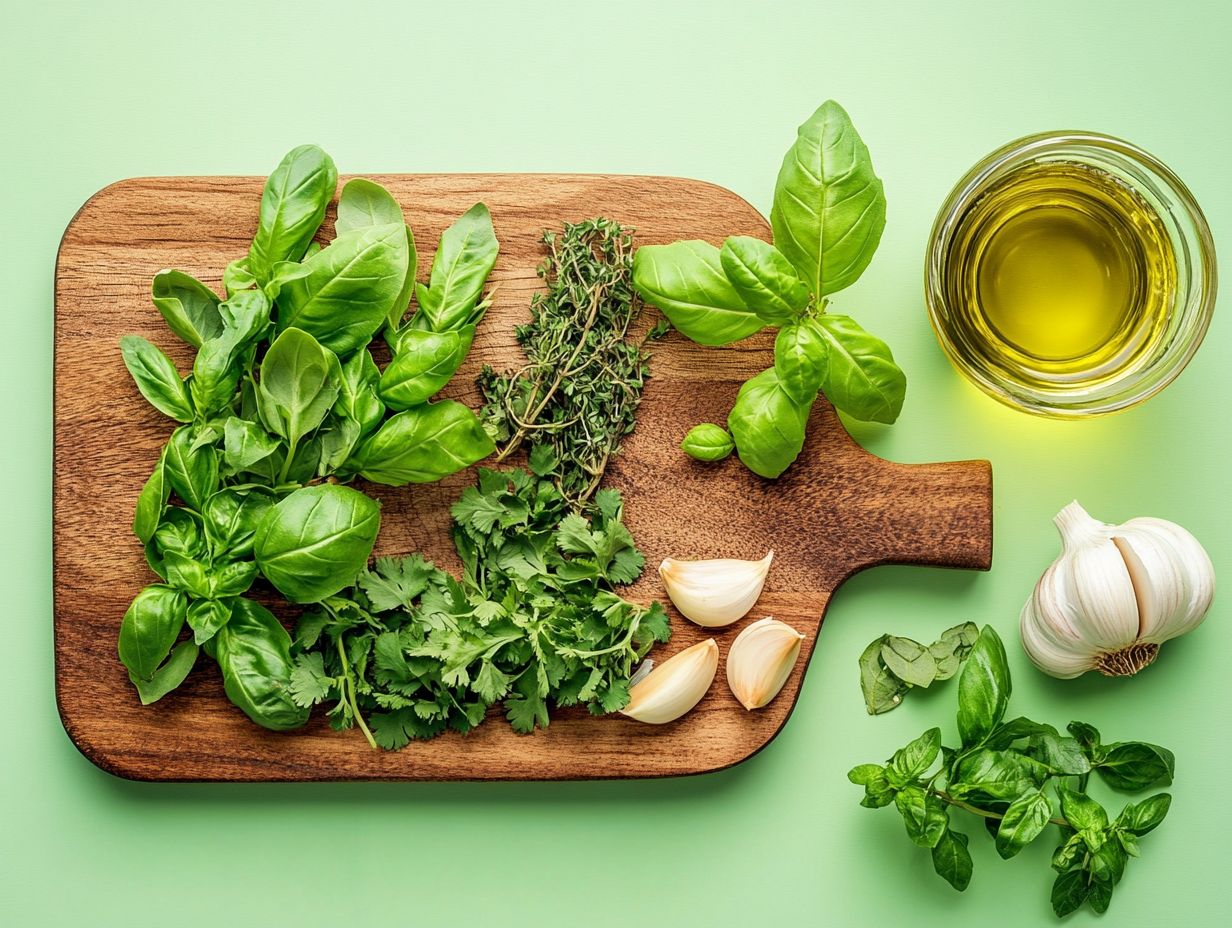
Looking for the best herbs to lower your cholesterol?
Some of the top herbal solutions for reducing cholesterol include garlic, turmeric, ginger, fenugreek, guggul, and green tea.
How does garlic help in reducing cholesterol levels?
Garlic contains allicin, which has been shown to lower cholesterol levels. It also has anti-inflammatory properties that can help prevent plaque buildup in the arteries.
Can turmeric be used to lower cholesterol?
Yes, turmeric contains curcumin, which has been found to reduce LDL (often called ‘bad’ cholesterol) levels and increase HDL (known as ‘good’ cholesterol) levels.
What is the recommended dosage for ginger to reduce cholesterol?
The recommended dosage for ginger to reduce cholesterol is 2-4 grams per day. You can consume it in powdered form, as tea, or in food.
Is fenugreek effective in lowering cholesterol?
Yes, fenugreek has been used in traditional medicine to lower cholesterol levels. It contains compounds called saponins that can help reduce the absorption of cholesterol in the intestines.
How can guggul help in reducing cholesterol?
Guggul contains guggulsterones, which have been shown to decrease LDL cholesterol levels and increase HDL cholesterol levels. It can also help reduce inflammation and improve blood flow.
In summary, incorporating these herbs into your diet can be a flavorful way to support your heart health. Don’t hesitate to explore their benefits!


